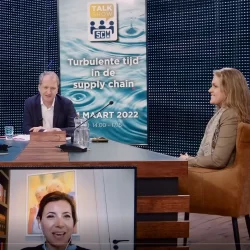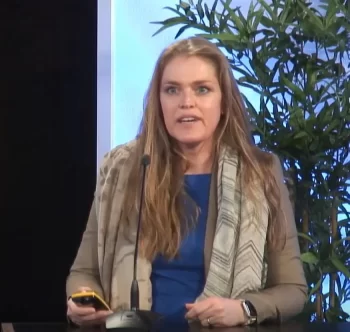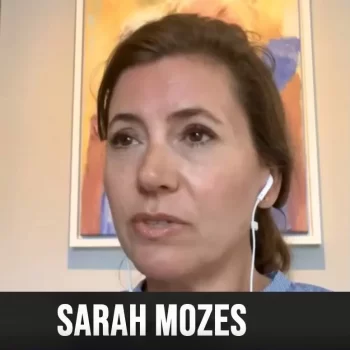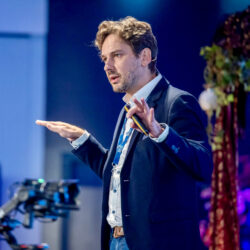Disruption affects supply chains of Ace & Tate and Adama

What is the impact of disruptions like the war in Ukraine? And how can we protect our supply chains against them? Those were the two most pressing questions during the very first SCM Talk Show on 31 March. Sarah Mozes from eyewear brand Ace & Tate and Annika Goudswaard from Adama, a manufacturer of crop protection agents, were in the studio to share their experiences: “If there are any logistics service providers who can help with transport to Ukraine, I would love to hear from them.”
By Marcel te Lindert
Even a glorious summer can cause supply chain disruption. In 2018, the Netherlands experienced the hottest summer in over 300 years. Ace & Tate, which had existed for just five years at that time, sold so many sunglasses that the supply chain could not keep up with demand. “We had trendy shops, a trendy web shop and trendy designs, but that was about it. We had plenty of stock, but it was all in the wrong place. Our ERP system showed the total stock, but not where it was located. In addition, our supplier of lenses had a shortage of production capacity. And our head office was full of returns, and we hadn’t yet set up a proper process for them. The result: customers sometimes called us in tears and our customer service department had no idea what was going on – and neither did our operational people,” said Supply Chain Director Sarah Mozes during the talk show.
Containers in Odessa
 Disruption was the main topic of conversation during the first SCM Talk Show. Disruption can have a big impact on supply chains. At Adama they are feeling the effects of the war between Russia and Ukraine, as the cooperation with numerous chain partners in former Soviet Union countries has been disrupted. “Yesterday I finally received some good news; the products that were stuck in the port of Odessa have arrived in Lviv,” stated Annika Goudswaard, Regional Supply Chain Manager Europe at Adama. “But we still have 20 containers stuck in Turkey that can’t get to Lviv. We’ve now decided to ship them back to Rotterdam and then transport them to Ukraine by road. So if there are any logistics service providers who could help us with that, I would love to hear from them.”
Disruption was the main topic of conversation during the first SCM Talk Show. Disruption can have a big impact on supply chains. At Adama they are feeling the effects of the war between Russia and Ukraine, as the cooperation with numerous chain partners in former Soviet Union countries has been disrupted. “Yesterday I finally received some good news; the products that were stuck in the port of Odessa have arrived in Lviv,” stated Annika Goudswaard, Regional Supply Chain Manager Europe at Adama. “But we still have 20 containers stuck in Turkey that can’t get to Lviv. We’ve now decided to ship them back to Rotterdam and then transport them to Ukraine by road. So if there are any logistics service providers who could help us with that, I would love to hear from them.”
The numerous sanctions make it even more difficult to do business with value chain partners in Russia and Belarus. “We have gone through the sanctions list meticulously. Fortunately, our chain partners are not on it. Meanwhile, Russia itself is doing everything it can to receive our goods. It has even lifted the import duties. But it’s difficult to find carriers serving Russia and to arrange insurance for shipments to Russia,” said Goudswaard, who referred to it as a moral dilemma. “We have considered whether we should suspend our activities in Russia and Belarus, like so many other companies have. But our products are so important for the food supply that we have decided to carry on.”
Delays due to Brexit
 So far, Ace & Tate’s supply chain has not been affected by the war in Ukraine. “We don’t have any stores there and don’t source any raw materials from there, and our transport routes don’t pass through those countries either. But the situation certainly isn’t helping us to get our operation into a more stable, positive flow,” explained Mozes. In contrast, Brexit did have an impact: “We used to deliver orders to UK consumers from the Netherlands, but in the first few weeks after Brexit those deliveries often got stuck. We tried everything to prevent that, but eventually decided to open a warehouse in the UK, because the delays and hence the costs were simply unacceptable.”
So far, Ace & Tate’s supply chain has not been affected by the war in Ukraine. “We don’t have any stores there and don’t source any raw materials from there, and our transport routes don’t pass through those countries either. But the situation certainly isn’t helping us to get our operation into a more stable, positive flow,” explained Mozes. In contrast, Brexit did have an impact: “We used to deliver orders to UK consumers from the Netherlands, but in the first few weeks after Brexit those deliveries often got stuck. We tried everything to prevent that, but eventually decided to open a warehouse in the UK, because the delays and hence the costs were simply unacceptable.”
Mozes explained how she set up Ace & Tate’s supply chain after her appointment in the autumn of 2018. She strengthened the organization, tackled the ordering process and inventory management, and optimized the supply chain network. “The frames for our sunglasses mostly come from China, and to a lesser extent from Cambodia and Italy. In the last two years, we have moved even more of our production from China to Cambodia. We’re now considering nearshoring our production activities, partly because of the coronavirus crisis but also because of various sociopolitical developments. If we produce closer to home, we can control the supply chain better. It just goes to show: you can spend a long time setting up a new supply chain network, and then you can find yourself working on a new one before the ink is even dry.”
Lockdown in Shanghai
Because Adama is part of the Chinese conglomerate ChemChina, it retains strong ties with China. “We’ve built a new R&D centre there and also opened a strong sales office. China is an important growth market, and we want to become an even more important player there,” indicated Goudswaard. 80% of the products for the European market currently come from Israel, and Adama also has factories in Poland, Spain and Italy. “A few years ago, we set up a big new factory in China, where many of our raw materials come from. China is a terrific country, but it’s often a case of all or nothing. Now Shanghai is in lockdown because of a coronavirus outbreak. What will that mean for our safety stocks? We buy our raw materials seven months in advance and still have some buffers for now, but we can’t ignore the lockdown in Shanghai.”
Nearshoring not only helps to reduce the supply chain risks, but also offers other advantages. Mozes cited shorter lead times as an example. “Our supply chain is not unusual in its ‘need for speed’. Producing close to home results in shorter lead times for both transport and manufacturing. Making the frames for our sunglasses entails around 30 production steps. Our suppliers in China perform these steps one after the other. In Italy, they use a different production process which enables them to carry out multiple steps simultaneously. That makes a big difference in terms of speed.”









